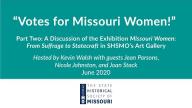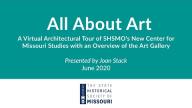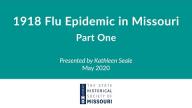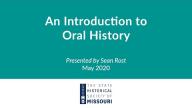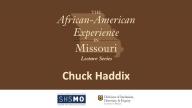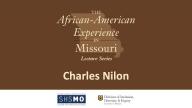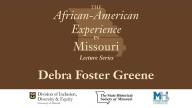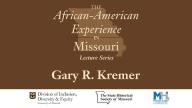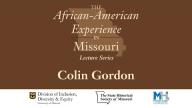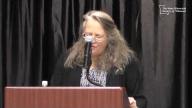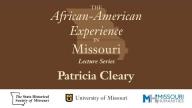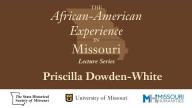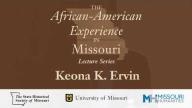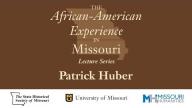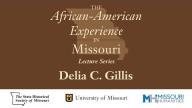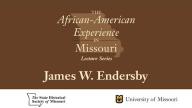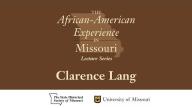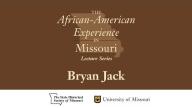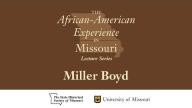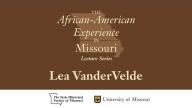SHSMO workshops, lectures, and virtual programs are freely available to worldwide audiences to watch anytime.
Videos
A special exhibition at the State Historical Society of Missouri curated by the Missouri Historic Costume and Textile Collection at the University of Missouri was on display in 2020 to mark the 100th anniversary of the 19th Amendment, which gave women in the United States the right to vote.
Chuck Haddix shares new information on Charlie Parker’s time in Kansas City, giving fresh insight into his formative years as a man and musician and will feature previously unknown photos, newspaper coverage, manuscripts and recordings that illustrate the emerging genius of Charlie “Bird” Parker.
Civic leader Bill Thompson invites longtime resident Sehon Williams to look back on growing up in Columbia during the era of segregation, and the legacy of the Sharp End district that was home to black-owned businesses in the central part of Columbia. Sharp End was destroyed with the urban renewal movement of the 1960s.
The predominantly black residents of North City St. Louis live in neighborhoods where green spaces have been shaped by two legacies: formal green spaces associated with parks, cemeteries, and private streets that reflect the goals of pre-World War II city leaders, business people, planners, and residents; and informal green spaces created by urban renewal, population declines, and home abandonment since the 1950s.
The African American Press has a long history of agency and activism. Dating its founding from 1827 with the publication of Freedom’s Journal in New York, the press has a legacy of protest and a history of the struggle for survival. Between 1875 and 1970, Missouri was home to more than 60 black-owned newspapers. Debra Foster Greene looks at the lives and works of several African American newspaper publishers and editors in the Show-Me State.
Gary R. Kremer explores the history of Lincoln University from its founding by former Missouri slaves in 1866 through its emergence as a state-funded normal and vocational school to its establishment as the state’s only public institution of higher education for African Americans in 1921. Special attention is given to Lincoln University’s “golden years,” from 1921 through the mid-1950s, when it was often referred to as the “Black Harvard of the Midwest.”
In his path-breaking book Mapping Decline: St. Louis and the Fate of the American City, Colin Gordon combined GIS digital mapping techniques with extensive archival research to reach new perspectives on St. Louis’s decades-long struggles with depopulation, segregation, economic disparity, and urban decay. Gordon's current research continues to probe for deeper understanding of the underlying issues and failed policies behind urban crises such as the turmoil in Ferguson after Michael Brown was shot and killed by local police on August 9, 2014.
Priscilla Dowden-White explores the life and legacy of St. Louis attorney and NAACP leader Margaret Bush Wilson. In her lifelong struggle to advance freedom and equality for African Americans, women, and all those who were excluded from the mainstream of society, Wilson blazed a courageous trail marked by landmark legal decisions and major civil rights advances that opened doors to equal opportunity for all. Dowden-White examines the philosophical viewpoints and experiences that shaped Wilson’s definition of justice and fairness for all.
Patrick Huber, professor of history at Missouri University of Science and Technology, presents his work on the Ste. Genevieve Race Riot of 1930. The riot was a four day disturbance, long shrouded in secrecy, during which vigilantes drove away most of the town’s black residents, many of whom were recent arrivals recruited to work in local lime kilns and stone quarries.
Delia C. Gillis, professor of history and director of the Center of Africana Studies at the University of Central Missouri, presents a visual history of Kansas City’s black professional class, exploring how local businesses, culture, and power dynamics shaped the present-day city.
Sowande’ Mustakeem, assistant professor of African and African American Studies at Washington University in St. Louis discusses the role of race and gender in a late nineteenth-century murder case. Mustakeem's presentation covers the death of Effie Jackson, a Kansas City woman killed by a rival for the affections of a man; Jackson’s case will serve as a basis to explore laws and institutions designed to police working-class African Americans.
Clarence Lang shares how current events in Black America, such as the recent protests in Ferguson, Missouri that propelled “Black Lives Matter” to national and international attention, continuously change the meanings of past struggles for Black freedom. Lang also showcases how St. Louis is representative of the broader US patterns of race relations, racial oppression, and resistance and share ways that contemporary historical framing can inform (or misinform) present-day, post-1960s movements for black lives.
Dr. Bryan Jack’s talk discusses material from his book, The Saint Louis African American Community and the Exodusters, which examines the thousands of African Americans who fled the post-Reconstruction south in search of political, economic, and social opportunity in the west.
St. Louis native Miller W. Boyd III shares insights from his groundbreaking research into the African American experience in Missouri during the Civil War. In unraveling the traditional motives for service—fighting to destroy slavery in America, securing black citizenship, and preserving the Union—Boyd shows that personal freedom and a chance to financially provide for families were often stronger motivations to enlist.
Lea Vandervelde discusses her most recent book, Redemption Songs: Suing for Freedom before Dred Scott, a groundbreaking study of more than 300 freedom suits in St. Louis. Through the careful evaluation of 12 cases, the book offers insights into the practice of slavery and the lives of those enslaved in Missouri.

